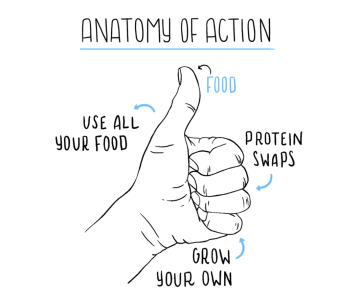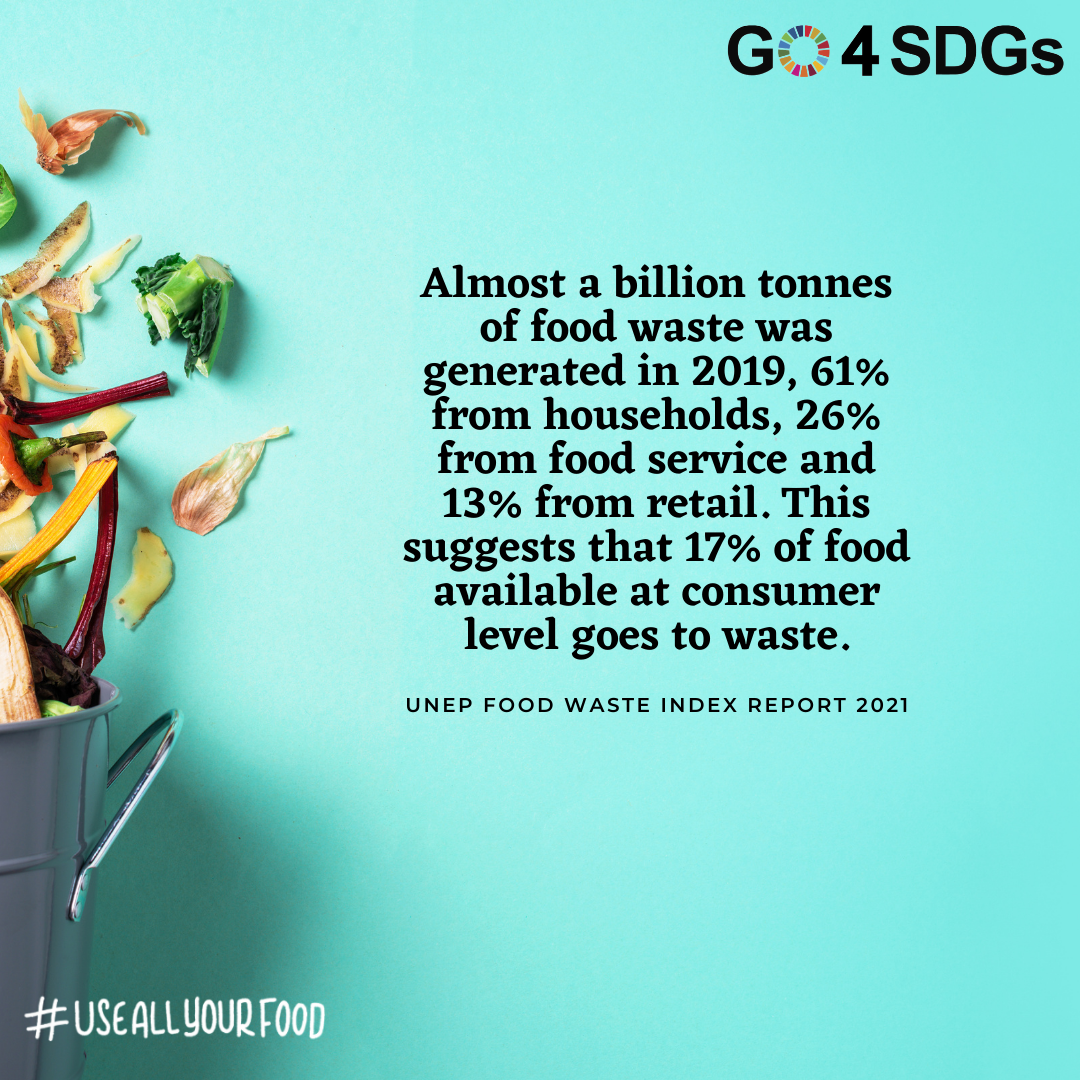
The SDG 12.3 calls us to halve global food waste by 2030. Embrace the #AnatomyOfAction challenge to turn your eating habits into daily activism against climate change.

What’s the environmental impact of our FOOD consumption?
- If everybody on Earth would eat a plant-based diet, there could be a 76% reduction in land used for food production.
- Food loss and waste produce 8-10% of greenhouse gas emissions[1] – just below the two most polluting countries[2].
- Locally grown food preserves genetic diversity and benefits the environment and wildlife[3].
Anatomy of Action: your guide towards a sustainable lifestyle
The Anatomy of Action aims to engage people in shifting to nature-positive individual behaviours by transforming our way of consuming and producing (SDG 12). Raising a collective voice is crucial in convincing and committing policymakers and industries to a green transition!

By participating in the 15-day #AnatomyofAction social media challenge, you’ll sample a number of tricks to become a sustainable living activator. Creating a new recipe with your leftovers, discovering local tourist attractions, and repurposing an old t-shirt are fulfilling activities that bring a positive climate impact.
Challenge your own habits across five domains: food, stuff, move, money, and fun! And connect with other activators to explore a world of everyday actions that contribute to the health of people and planet.
For every domain, we identified three concrete steps to live better and lighter within our communities. Let’s start by the FOOD we buy!
According to FAO, rising global demographic trends will lead to 70% increase of the demand for livestock products within 2050[4]. However, meat and dairy productions already account for 14.5% of all human-induced gas emissions[5]! Not counting other side-effects such as deforestation, soil acidification and biodiversity loss[6].
There are plenty of ways to start reducing your intake of animal products. Becoming flexitarian or a weekday vegan is an excellent stepping-stone: you may discover a world of tasty plant-based recipes.
And don’t forget that environment-sensitive nutrition does not only benefit the planet, but it also improves your overall health – especially your immune, circulatory, and digestive systems[7].
Scientific evidence says we throw away one third of all food produced for human consumption[8]. This causes huge amounts of organic waste in landfills to release methane, a gas which is 25 times more harmful than CO2 in contributing to the greenhouse effect and, ultimately, to global warming[9].
The 29th of September marks the International Day of Awareness of Food Loss and Waste. On this occasion, retrieve the leftovers from your fridge and have fun in inventing an undiscovered mix of ingredients! Remember that “good looks” in food do not equate with quality, so do not throw away fresh veggies just because of their imperfect appearance.
In case it is too late to save, you will be amazed by the quantity of food and vegetal waste you may reuse for your compost. Composting enriches the soil of your plants, suppressing disease or pests to the place of chemical fertilisers[10]. And, of course, it shrinks your carbon footprint by saving your litter from the landfills.
Global food trade has a tremendous environmental cost in terms of water use, soil erosion, biodiversity systems, air pollution, and harmful emissions[11] - quantified as US$3 trillion every year[12]. Industrial agriculture routinely implies chemicals and artificial hormones which also pose threats to human health[13].
To benefit both nature and your well-being, opt for locally-grown food and – where possible – grow your own! It may turn into a fulfilling hobby and bring you closer to your community.
When you eat freshly harvested seasonal food, you assume a bunch of vitamins, mineral and antioxidant improving your overall health! It will lighten your carbon footprint and allow you to trace the production chain – so that you actually know where your food is coming from.
Take part to the 15-day social media challenge launched by the Anatomy of Action. You may question your own habits, experiment with new ones, and even realise that they suit you better than the old ones!
Embrace the green change within your local community and ask your representatives to advocate for environmental solutions to today’s global crises.
[1] IPCC Special Report on Climate Change, Desertification, Land Degradation, Sustainable land management, Food Security, and Greenhouse Gas Fluxes in Terrestrial Ecosystems.
[2] FAO – Food wastage footprint: Impacts on natural resources, 2013
[3] University of Vermont – Ten reasons to buy local, 2010. Retrieved by: https://www.uvm.edu/vtvegandberry/factsheets/buylocal.html
[4] FAO - Tackling Climate Change Through Livestock: A Global Assessment of Emissions and Mitigation Opportunities, 2013. Retrieved by: http://www.fao.org/3/i3437e/i3437e.pdf
[5] Ibidem
[6] Meat industry is held responsible for 60% of biodiversity loss. WWF - Living Planet Report 2016: Risk and resilienvce in a new era. Retrieved by: https://c402277.ssl.cf1.rackcdn.com/publications/964/files/original/lpr_living_planet_report_2016.pdf?1477582118&_ga=1.148678772.2122160181.1464121326
[7]Clark, A., Springmann, M., Hill, J., & Tilman, D. (2019). Multiple health and environmental impacts of food. Retrieved by: https://www.pnas.org/content/116/46/23357?__cf_chl_jschl_tk__=pmd_14a1a0b42de30a053d96296ebce2203a01dae0ce-1627474166-0-gqNtZGzNAeKjcnBszQi6
[8] FAO – Food Loss and Waste Database. Retrieved by: http://www.fao.org/food-loss-and-food-waste/flw-data
[9] CBC – Food waste has environmental impacts: scientists say. Retrieved by: https://www.cbc.ca/news/science/food-waste-has-environmental-impact-scientists-1.828102
[10] EBA – Composting at Home. Retrieved by: https://www.epa.gov/recycle/composting-home
[11] Dalin, C., & Rodrìguez-Iturbe. (2016). Environmental impacts of food trade via resource use and greenhouse gas emissions. Retrieved by: https://iopscience.iop.org/article/10.1088/1748-9326/11/3/035012/pdf
[12] S&P Global. Retrieved by: https://www.spglobal.com/esg/trucost
[13] See reference 11.
